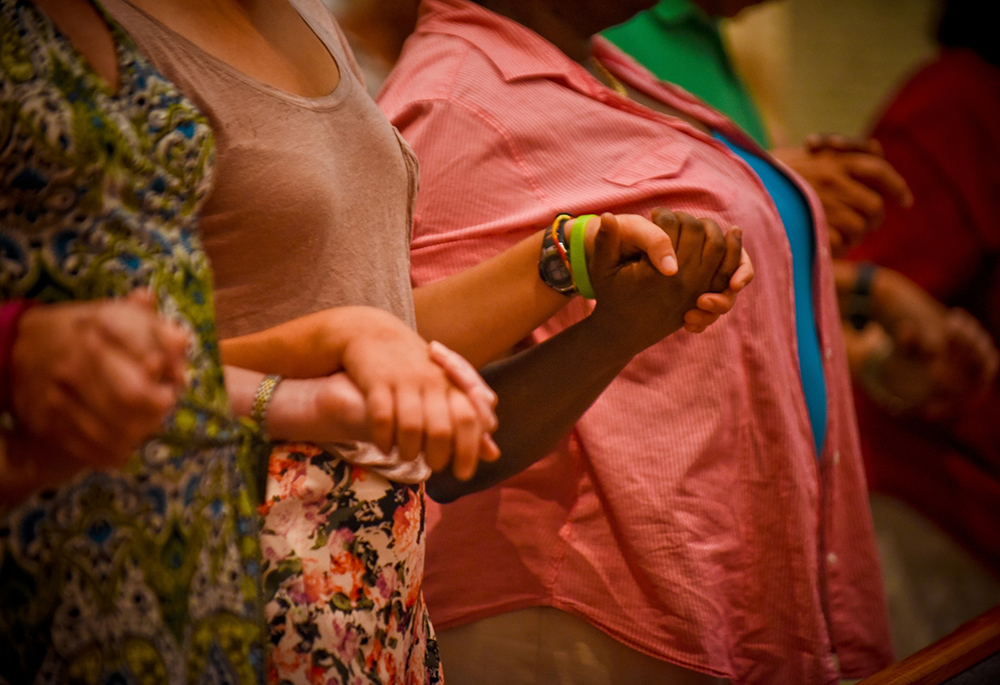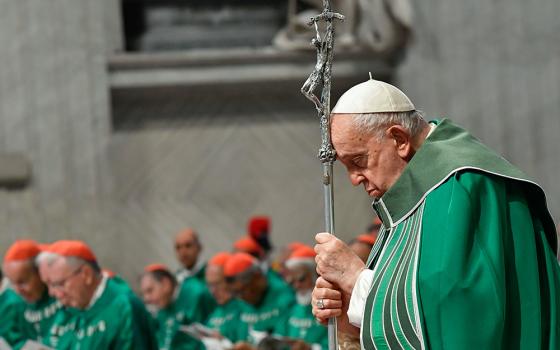
Congregants hold hands and pray during Mass in a 2016 file photo. (CNS/Catholic Herald/Juan C. Medina)
"I believe in one, holy, catholic and apostolic Church." Or so I say every week. It's a church I have belonged to my whole life, a church I've given my life to, and a church still becoming a truer version of what it says it is.
Two weeks ago, on Sept. 19, the United States Conference of Catholic Bishops released its national synthesis of the synodal process in the United States. Bringing the diocesan phase of the synodal process to a close, this document provides an overview of the over 22,000 reports gathered by U.S. dioceses from individual parishes and other groups. As one of the estimated 700,000 people who participated in the synod in the United States, I opened the national synthesis with an air of both caution and hope.
To be honest, hope and caution were the feelings that accompanied me when I took part in a synodal listening session this past spring. Shuffling into a classroom with about 50 other people, a cautious hopefulness (or was it a hopeful cautiousness?) filled me. My hope was in a process that brought people together to listen and discern, reliant on relationships and open to the Holy Spirit. My reticence stemmed from a fear that either the process wouldn't live up to that expectation or it would be so expansive that the variety of voices speaking in the process would be lost.
Greeted by an invitation to silent reflection followed by intentional listening and sharing, the session offered a safe space for participants to offer their hopes and desires as well as disappointments and disaffections. Naming what "we" do well as a church and what needs more attention, there was a respect in the room as we listened to the stories shared and gathered a vision of church that it seemed we all could recognize in one way or another.
Advertisement
As I looked around, I saw a room full of "living human documents," to borrow a term from Anton Boisen. Filling the classroom like a living library, we formed a full display of the lessons, lesions, and longings of faithfully lived lives of faith. Each one bearing their own story and sharing what they were able, naming from their experience the church for what it is and imagining what it could be in communion.
By the end of that session, I found myself hope-filled as I signed up to be part of a team of participants who would synthesize the reports from a series of synodal meetings. Later, combing through the written results of multiple sessions, I bristled at opinions I didn't necessarily agree with, priorities that didn't align with my own, and issues that I thought would never make it to the national synthesis. Looking at the report of mixed perspectives and priorities our team submitted, I wondered what would surface on the other side of the synod. Even as caution returned, I found myself confronted by the fact that there on the page was the voice of a church, nearly 2,000 years old, still finding its way.
Reading through the national synthesis, I've found the vision I feared might be lost in synthesis there on the page as well as those I'd wished would have been. One, holy, catholic and apostolic church. Voices speaking about the ordination of women as “as a matter of justice” and attention to racism and the need to cultivate means of welcoming LGBTQ+ persons as well as the disabled and disenfranchised were placed next to lamentations about “limited access to the 1962 Missal,” disengagement in parish communities accelerated by COVID-19, and the spread of cultural divisions reflective of larger societal polarization within the faithful, and especially within the hierarchy. One, holy, catholic and apostolic church, I reminded myself.
As James Joyce famously quipped in Finnegans Wake, "Catholic means 'Here comes everybody.' " That's part of the universalism that is being catholic. And while the oneness we proclaim may be a hard-forged unity, the national synthesis offers hope that even if it is not a full reality, unity is desired by people on all sides of the ecclesial aisle.
Studying reports on diocesan synodal reports and commentaries on the wealth of input released during the synodal process, I have been edified by the honesty and humility with which we, the church, have undertaken this process.
Has it been perfect? No. Did it take place everywhere? Also, no. Were enough voices heard? With an estimated 700,000 participants out of 66.8 million U.S. Catholics, a figure of about 1%, the answer once again is "no."
Yet still something is being done, voices are being raised, relationships built, consciences challenged.
Small though it is, the 1% is confronting the echo chamber that can be the church circles we choose to run in. Calling our attention to how we hear messages that challenge us in ways we feel comfortable, what voices we seek out to support our side, and where we search out conversation partners and companions on the journey. And the invitation from that small sample is offered to the whole church.
As Bishop Daniel Flores of Brownsville, Texas, writes in the national aynthesis' introduction, "The publication of this document is not a concluding moment … it is a reflective, forward-moving moment. It is an invitation to listen, to discuss together and to discern together as the Church, about how best to understand and act upon those matters that sit deeply in the hearts and minds of Catholics in the U.S."
This is a moment. A moment which marks what has been and the conversations that have been had and also a moment that looks forward. The synthesis report does not leave behind what has occurred in parishes and meeting halls, it does not forego the work of future Zoom calls and homegrown gatherings. It acknowledges that these gatherings were fruitful. That in those spaces concerns and wounds came to light, desires and joys were shared with faith, hope and love.
For individuals, communities and the church writ large, this synodal moment is not over and the U.S. synthesis report makes that clear. To stop now would be to curtail the Spirit, to cut the conversation off mid-sentence.
We must keep on listening, speaking and acting, in the Spirit and with one another. As the synthesis advises, “Attentive listening in the Church provides the catalyst for engaging discernment.” With engaged discernment, we can read each other as living documents with openness, respect and curiosity, learning in the process and growing as the body of Christ.
As Flores again writes, “The Synthesis is, among other things, an expression of what we as a Church have heard each other say when asked about our deepest preoccupations and hopes for the Church of which, by the grace of God, we are all a vital part.”
As we continue this synodal journey in faith, hopeful if but cautious, we must remember that each of us is vital to this church. Together as living documents, we are one, holy, catholic and apostolic. Our call is to live what we profess. Inscribed with grace, our lives bear witness to the Spirit at work in synod reports and in the living documents that we are.







